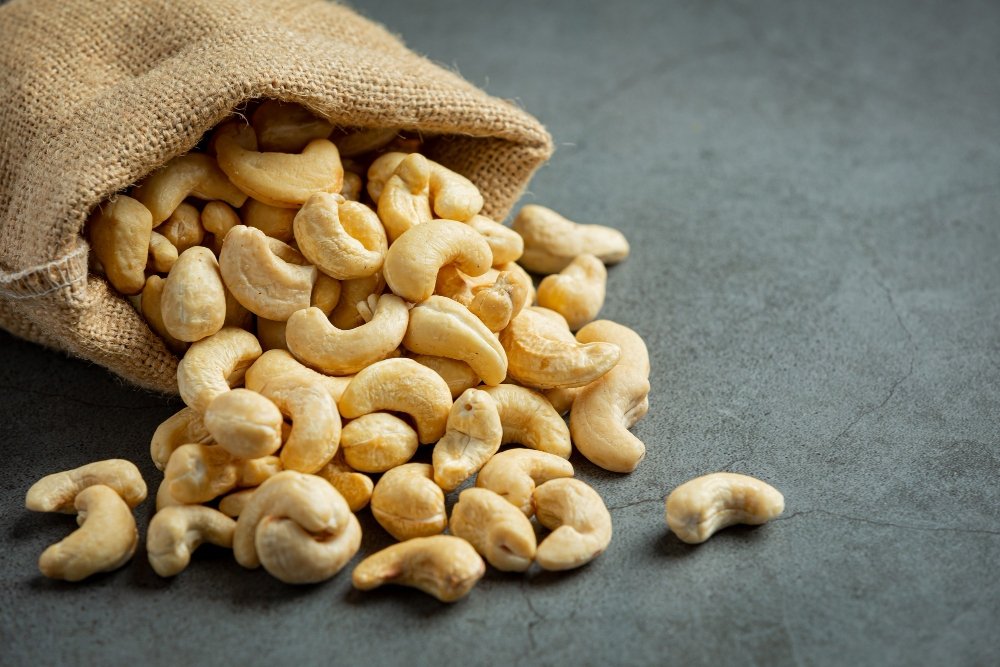Cashews are a kidney-shaped seed derived from the cashew tree, a tropical tree native to Brazil that is currently grown in a variety of warm areas around the world. Cashews are seeds even though they are frequently referred to be tree nuts and are nutritionally identical to them. They’re high in nutrients and plant components, and they’re simple to include in a variety of recipes. Irrespective of the benefits people are unaware of the disadvantages or harm cashew nuts do to people.
Disadvantages of cashew nuts are:
1. Allergies:
People with nut allergies may not have a reaction to cashew, but this is not assured because cashew has many of the same properties as tree nuts, and if you have a pre-existing legume allergy, you are at an even higher chance of developing a cashew allergy.
It has been reported that cashew allergy is becoming more common in the Western world, particularly among children. Abdominal pain, gastrointestinal distress, vomiting, runny nose, shortness of breath, difficulty swallowing, itchy nose and/or mouth, or, in the most severe cases, anaphylaxis are all signs and symptoms of a cashew nut allergy.
2. Sodium Levels Are High:
Sodium is also known as salt to those who are unfamiliar with the term. And, as we all know, too much salt in your diet can harm your heart health by raising blood pressure, promoting fluid retention, and increasing your risk of stroke. When you consider how much salt you get from every other dietary source – the volume of salt in your daily diet can certainly add up quickly.
30mg of cashews contain as much as 3mg of sodium, the recommended daily dose of sodium is 1,500 mg, so you might think “well, that’s not too bad then,” but when you consider how much salt you get from every other dietary source – the volume of salt in your daily diet can certainly add up quickly.
3. Kidney Stones:
Cashews are also high in oxalate salts, which interfere with calcium absorption in the body. Kidney stones can occur if your body does not absorb enough calcium.
4. Weight gain as high in calorie:
Cashews have a somewhat high-fat content, and while most of it is “healthy” fat when ingested in large amounts, the calories can pile up quickly, leading to weight gain. The calorific value of a 30g chunk of cashew (about 15) is 157 calories or 657 kilojoules.
This is for cashews in their natural state (steamed to remove the shell and toxins but otherwise considered “raw”). When the nut is roasted and any seasonings or additives are added, the calorie count rises. It is recommended that you consume the nut with caution since the convenience of the nut might lead to overconsumption.
5. Poisonous:
When cashews are raw, they contain caustic acid that can burn the skin when shelled. Raw cashews are dangerous to eat, which is why you’ll rarely see them for sale in their “natural” state. The toxin present in cashew shells is called urushiol, and it’s the same molecule that causes poison ivy. The skin damage is caused by this, however, once the cashew has been shelled and cooked, the “poisons” are no longer active, and the nut can be eaten.
6. Medication Interactions:
Vitamin K is abundant in cashews, which can interfere with warfarin’s anticoagulant properties (a blood thinner). Cashews are also high in magnesium, which implies that patients using blood pressure drugs may suffer a greater effect from their anti-hypertensive medications, causing their blood pressure to drop too low.
Frequently asked questions (FAQ)
- If you eat cashews every day, what happens?
Cashew is known as the “King of Dry Fruit,” and while it is a little pricey, it offers numerous health benefits. Eating cashews on a daily basis is helpful, however, eating too many cashews daily might be hazardous.
- Can cashews give you a headache?
Yes, too many cashews might give you a headache. However, there are numerous advantages to consuming cashews. Cashews, on the other hand, have a slew of negative side effects.
- Is it safe for diabetic patients to eat cashews?
Cashews are safe to eat for diabetics. Consumption of cashew nuts raises insulin levels. The ability of the body to absorb sugar is improved by eating cashew nuts. Because of the higher insulin levels, blood sugar remains under control.

